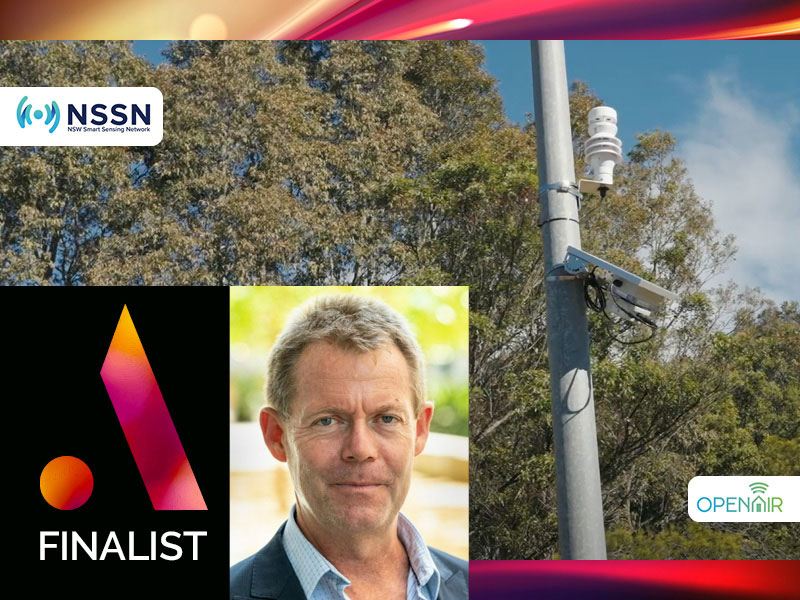In late 2019 and early 2020, Sydney was engulfed in toxic smoke from some of the worst bushfires Australia has ever faced.
Sydneysiders were confronted with the smoke, with some experiencing significant health impacts that have extended well into the present-day.
Following these events and concerns over air quality, the NSW Smart Sensing Network sent around a survey to local councils in the state to investigate air quality issues of concern to them and to gauge their current level of expertise in the monitoring of air quality.

The results reveal that local councils are facing huge air quality issues, everything from bushfire smoke to coal dust, and that many need a better understanding of what technology is available to monitor the air and how to deploy sensors.
This led the NSW Smart Sensing Network to launch the Operational Network of Air Quality Impact Resources (OPENAIR) in 2022, with a number of local councils in the state signing on to take part.
Six councils are now signed on to the scheme, which involves the installation of low-cost sensors in local areas, and regular meetings with the whole OPENAIR team to discuss the findings.
A key aim of the project is to improve the ability of local councils to conduct effective air monitoring and provide this data to the general public, and to create a nationally-consistent way of doing this, for the benefit of all.
Through OPENAIR, local councils are able to better combat the dangers of air pollution using its Australian-first common way to use low-cost smart sensors that measure the quality of air.
OPENAIR is a finalist in the InnovationAus 2024 Awards for Excellence in the GovTech Project, Product or Service category. You can secure your tickets to the black-tie gala event here.
The NSW Clean Air Strategy 2021 has a stated aim to reduce the number of premature deaths caused by air pollution in the state, with an estimated 600 people per year dying from these issues, and the associated health costs estimated to be $4.8 billion annually.
To do this, local councils will need a better understanding of how to monitor air quality, and how to use the data collected from doing this. That’s where OPENAIR aims to help.
The project’s platform allows for consistent, state-wide air quality data across all councils in NSW, on a single dashboard, complementing the existing data collected by the state-managed regulatory monitoring stations.
The collection of this data will help local authorities and organisations to explore air quality and heat challenges in specific places, and give the insights needed to improve local policy, planning and design decisions.
The collection of this data can also help these councils communicate with the public during extreme weather events, such as the bushfires of 2019-20.
A number of the councils involved with OPENAIR have hailed the success of the project.
“The OPENAIR project has been a great opportunity to pull together a broad range of partners to not only deliver supplementary air quality monitoring across the state but also upskill councils in their capability to collect, hold and share data,” Parramatta City Council said.
The Sutherland Shire Council also backed the effectiveness of OPENAIR.
“The OPENAIR project has provided a unique and welcome opportunity for Sutherland Shire Council to employ smart air quality sensor technology to monitor local air quality in the local government area,” it said.
“With the specialist guidance, support and technical expertise of the OPENAIR project team, the council has been able to scope out and define its air quality monitoring objectives, prepare a business case and determine the most appropriate locations and the type of smart air quality sensors to be used.”
Looking for brand exposure in front of Australia’s tech ecosystem? Purchase a table of 10 for the InnovationAus 2024 Awards for Excellence and have your logo displayed on screens across the venue and in the event programme as a table sponsor.
The InnovationAus 2024 Awards for Excellence are supported by: Australian Computer Society, Investment NSW, Department of Industry, Science and Resources, Technology Council of Australia, TechnologyOne, National Artificial Intelligence Centre, CSIRO’s ON Innovation Program, Reason Group, Q-CTRL, University of New South Wales, and IP Australia.
Protecting your great ideas with intellectual property (IP) rights can lead to lasting benefits for your growing business. IP refers to creations of the mind, such as a brand, logo, invention, design or artistic work. Head to the IP Australia website to find out more about IP, and how it might help your business.
Do you know more? Contact James Riley via Email.
